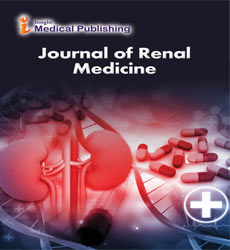Nephrotoxicity's Complications Include Systemic and Long-Term Effects on Kidney Health
Wang Michael*
Department of Nephrology, University of Kentucky, Kentucky, USA
- *Corresponding Author:
- Wang Michael
Department of Nephrology, University of Kentucky, Kentucky,
USA,
E-mail: michael@outlook.com
Received date: April 08, 2024, Manuscript No. IPJRM-24-19159; Editor assigned date: April 11, 2024, PreQC No. IPJRM-24-19159 (PQ); Reviewed date: April 25, 2024, QC No. IPJRM-24-19159; Revised date: May 02. 2024, Manuscript No. IPJRM-24-19159 (R); Published date: May 09, 2024, DOI: 10.36648/ipjrm.7.3.23
Citation: Michael W (2024) Nephrotoxicity's Complications Include Systemic and Long-Term Effects on Kidney Health. Jour Ren Med Vol. 7 No.3:23.
Description
Nephrotoxicity is a condition characterized by kidney damage due to exposure to certain substances or medication. Nephrotoxicity refers to the toxicity specifically targeting the kidneys, leading to impaired kidney function. The kidneys are highly vascular organs responsible for filtering waste products from the blood and excreting them in the form of urine. They also play a vital role in maintaining fluid and electrolyte balance, regulating blood pressure, and producing hormones involved in red blood cell production and bone health. Nephrotoxicity can result from exposure to various substances, including medications, environmental toxins, contrast agents used in medical imaging, and infectious agents. Nephrotoxicity can be caused by a wide range of substances, including medications, environmental toxins, contrast agents, and infectious agents.
Nephrotoxicity
Nephrotoxicity can occur through various mechanisms, including direct tubular toxicity, renal vasoconstriction, immunemediated injury, oxidative stress, mitochondrial dysfunction, and apoptosis. Direct tubular toxicity some nephrotoxic substances directly damage the renal tubules, impairing their ability to filter and reabsorb substances. Renal vasoconstriction certain substances can cause constriction of the renal blood vessels, reducing blood flow to the kidneys and impairing renal function. Immune-mediated injury in some cases, nephrotoxicity may result from an immune response directed against the kidneys, leading to inflammation and tissue damage. Oxidative stress occurs when there is an imbalance between the production of Reactive Oxygen Species (ROS) and the body's ability to neutralize them, leading to cellular damage. Mitochondrial dysfunction can impair cellular energy production and contribute to kidney injury. Nephrotoxic substances can activate cell death pathways, leading to the death of kidney cells and impaired kidney function. Symptoms of acute kidney injury may include decreased urine output (oliguria or anuria), fluid overload, electrolyte imbalances and uremic symptoms such as nausea, vomiting, fatigue, and confusion. In cases of chronic nephrotoxicity, symptoms may be less specific and may include proteinuria (presence of protein in the urine), hematuria (blood in the urine), hypertension, and edema. Medication use, exposure of environment toxins, and any recent illnesses or procedures is essential in identifying potential causes of kidney damage. A physical examination may reveal signs of fluid overload or signs of underlying systemic diseases that may be contributing to kidney damage. Laboratory tests such as serum creatinine and estimated Glomerular Filtration Rate (eGFR) can assess kidney function. Urinalysis can detect abnormalities such as proteinuria, hematuria, and urinary casts. Biomarkers of kidney injury, such as Neutrophil Gelatinase- Associated Lipocalin (NGAL) and Kidney Injury Molecule-1 (KIM-1), may also be measured to assess the severity of kidney damage.
Management of nephrotoxicity
The management of nephrotoxicity involves identifying and discontinuing the offending agent, providing supportive care, and treating underlying conditions contributing to kidney damage. Discontinuation of nephrotoxic agents if nephrotoxicity is suspected to be medication-related, discontinuing the offending agent is essential to prevent further kidney damage. Supportive measures such as fluid resuscitation, electrolyte replacement, and management of complications such as acidosis or hyperkalemia may be necessary, particularly in cases of acute kidney injury. Certain pharmacological agents may be used to mitigate kidney damage or prevent further injury. For example, N-acetylcysteine may be used to prevent contrastinduced nephropathy by reducing oxidative stress and enhancing renal blood flow. Allopurinol may be used to prevent tumour lysis syndrome, a complication of cancer treatment that can lead to acute kidney injury. In severe cases of nephrotoxicity, such as those resulting in acute kidney injury with fluid overload or severe electrolyte abnormalities, renal replacement therapy such as hemodialysis or continuous renal replacement therapy may be necessary to support kidney function and remove toxins from the blood. The prognosis of nephrotoxicity depends on various factors, including the severity and duration of kidney damage, the underlying cause, and the timely initiation of appropriate treatment. In some cases, kidney function may recover completely once the offending agent is discontinued and supportive care is provided. However, nephrotoxicity can also lead to CKD or ESRD if left untreated or if kidney damage is severe and irreversible. Long-term complications of nephrotoxicity may include hypertension, cardiovascular disease, and electrolyte imbalances.
Open Access Journals
- Aquaculture & Veterinary Science
- Chemistry & Chemical Sciences
- Clinical Sciences
- Engineering
- General Science
- Genetics & Molecular Biology
- Health Care & Nursing
- Immunology & Microbiology
- Materials Science
- Mathematics & Physics
- Medical Sciences
- Neurology & Psychiatry
- Oncology & Cancer Science
- Pharmaceutical Sciences
